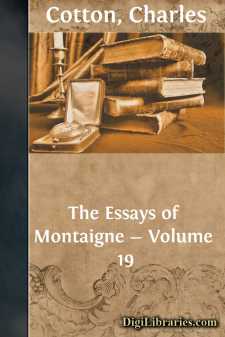Categories
- Antiques & Collectibles 13
- Architecture 36
- Art 48
- Bibles 22
- Biography & Autobiography 813
- Body, Mind & Spirit 142
- Business & Economics 28
- Children's Books 17
- Children's Fiction 14
- Computers 4
- Cooking 94
- Crafts & Hobbies 4
- Drama 346
- Education 46
- Family & Relationships 57
- Fiction 11829
- Games 19
- Gardening 17
- Health & Fitness 34
- History 1377
- House & Home 1
- Humor 147
- Juvenile Fiction 1873
- Juvenile Nonfiction 202
- Language Arts & Disciplines 88
- Law 16
- Literary Collections 686
- Literary Criticism 179
- Mathematics 13
- Medical 41
- Music 40
- Nature 179
- Non-Classifiable 1768
- Performing Arts 7
- Periodicals 1453
- Philosophy 64
- Photography 2
- Poetry 896
- Political Science 203
- Psychology 42
- Reference 154
- Religion 513
- Science 126
- Self-Help 84
- Social Science 81
- Sports & Recreation 34
- Study Aids 3
- Technology & Engineering 59
- Transportation 23
- Travel 463
- True Crime 29
The Essays of Montaigne - Volume 07
by: Charles Cotton
Categories:
Description:
Excerpt
A CONSIDERATION UPON CICERO
One word more by way of comparison betwixt these two. There are to be gathered out of the writings of Cicero and the younger Pliny (but little, in my opinion, resembling his uncle in his humours) infinite testimonies of a beyond measure ambitious nature; and amongst others, this for one, that they both, in the sight of all the world, solicit the historians of their time not to forget them in their memoirs; and fortune, as if in spite, has made the vanity of those requests live upon record down to this age of ours, while she has long since consigned the histories themselves to oblivion. But this exceeds all meanness of spirit in persons of such a quality as they were, to think to derive any great renown from babbling and prating; even to the publishing of their private letters to their friends, and so withal, that though some of them were never sent, the opportunity being lost, they nevertheless presented them to the light, with this worthy excuse that they were unwilling to lose their labours and lucubrations. Was it not very well becoming two consuls of Rome, sovereign magistrates of the republic that commanded the world, to spend their leisure in contriving quaint and elegant missives, thence to gain the reputation of being versed in their own mother-tongues? What could a pitiful schoolmaster have done worse, whose trade it was thereby to get his living? If the acts of Xenophon and Caesar had not far transcended their eloquence, I scarce believe they would ever have taken the pains to have written them; they made it their business to recommend not their speaking, but their doing. And could the perfection of eloquence have added a lustre suitable to a great personage, certainly Scipio and Laelius had never resigned the honour of their comedies, with all the luxuriances and elegances of the Latin tongue, to an African slave; for that the work was theirs, its beauty and excellence sufficiently declare; Terence himself confesses as much, and I should take it ill from any one that would dispossess me of that belief.
'Tis a kind of mockery and offence to extol a man for qualities misbecoming his condition, though otherwise commendable in themselves, but such as ought not, however, to be his chief talent; as if a man should commend a king for being a good painter, a good architect, a good marksman, or a good runner at the ring: commendations that add no honour, unless mentioned altogether and in the train of those that are properly applicable to him, namely, justice and the science of governing and conducting his people both in peace and war. At this rate, agriculture was an honour to Cyrus, and eloquence and the knowledge of letters to Charlemagne. I have in my time known some, who by writing acquired both their titles and fortune, disown their apprenticeship, corrupt their style, and affect ignorance in so vulgar a quality (which also our nation holds to be rarely seen in very learned hands), and to seek a reputation by better qualities. Demosthenes' companions in the embassy to Philip, extolling that prince as handsome, eloquent, and a stout drinker, Demosthenes said that those were commendations more proper for a woman, an advocate, or a sponge, than for a king':
"Imperet bellante prior, jacentem
Lenis in hostem."
["In the fight, overthrow your enemy, but be merciful to him when
fallen.—"Horace, Carm....












